XPFT-20402 Leadership Development: Case Study & Leader Comparison
VerifiedAdded on 2023/04/03
|10
|1904
|458
Report
AI Summary
This report presents a leadership case study divided into three parts. Part A details a personal leadership experience focusing on team development and achieving career goals. Part B analyzes the leadership qualities of Steve Jobs, highlighting his vision, adaptability, and focus. Part C compares the author's leadership style with that of Steve Jobs, drawing lessons on focus and simplification. The report reflects on the importance of vision, commitment, and continuous improvement in leadership, emphasizing the impact of leadership on team performance and organizational success. This document is a valuable resource for students seeking solved assignments and case studies.
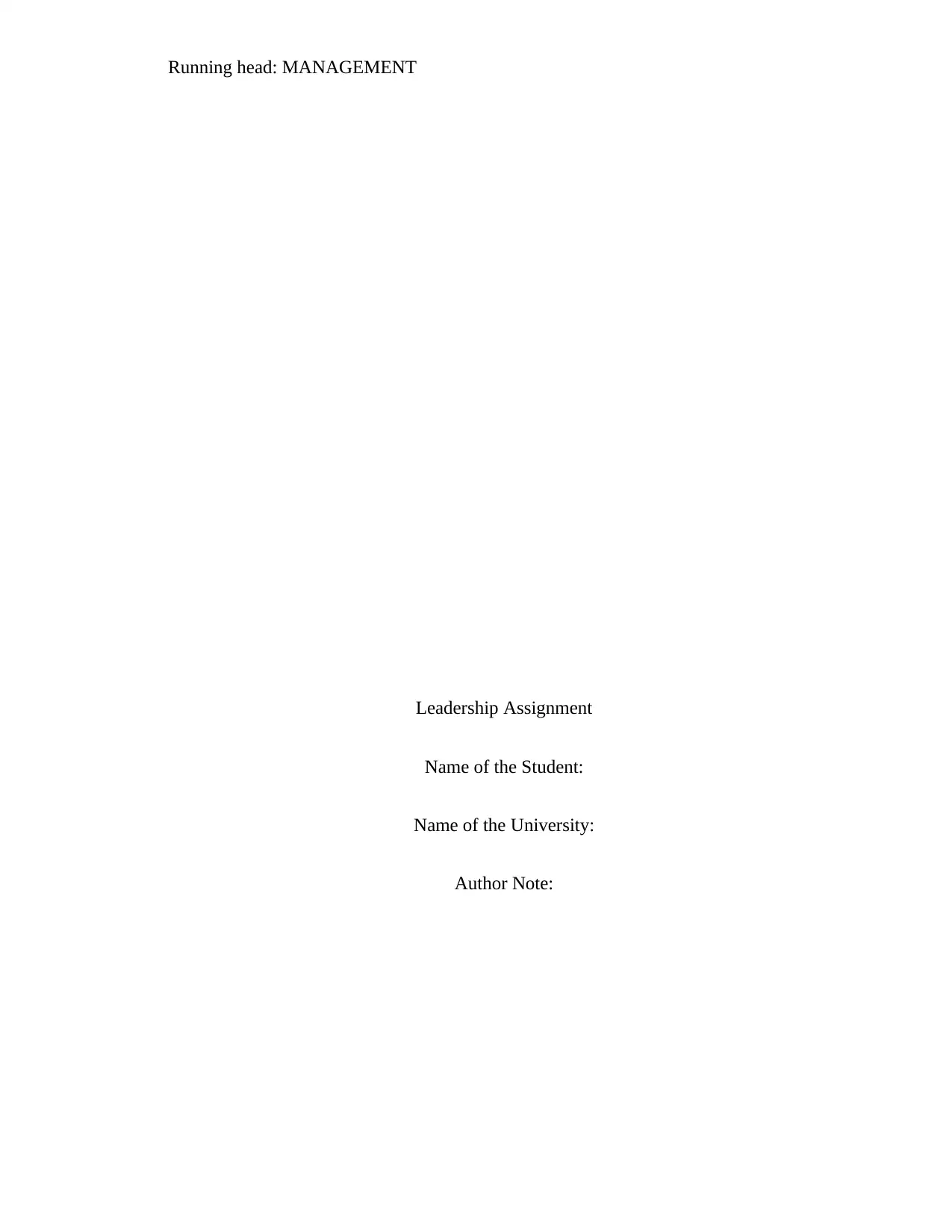
Running head: MANAGEMENT
Leadership Assignment
Name of the Student:
Name of the University:
Author Note:
Leadership Assignment
Name of the Student:
Name of the University:
Author Note:
Paraphrase This Document
Need a fresh take? Get an instant paraphrase of this document with our AI Paraphraser
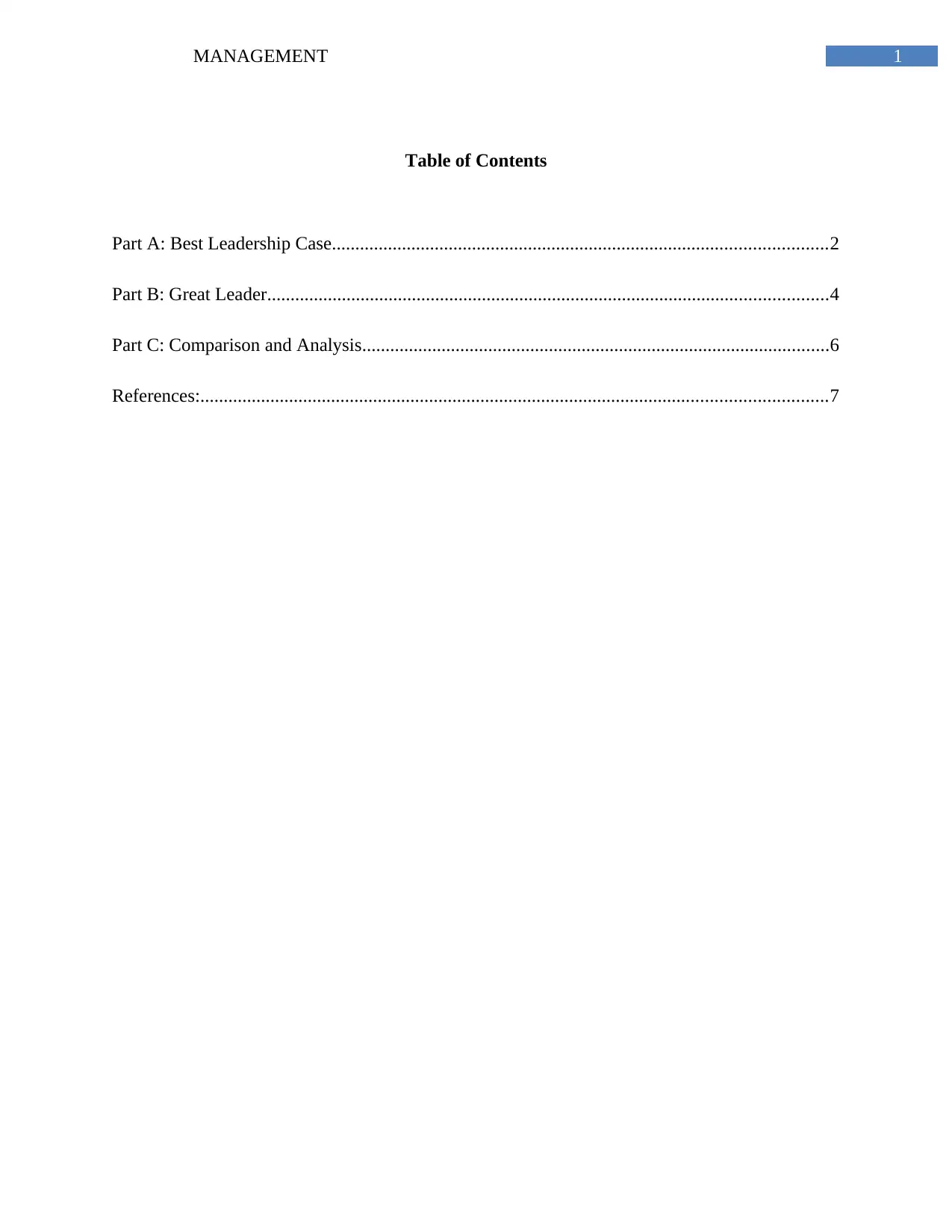
1MANAGEMENT
Table of Contents
Part A: Best Leadership Case..........................................................................................................2
Part B: Great Leader........................................................................................................................4
Part C: Comparison and Analysis....................................................................................................6
References:......................................................................................................................................7
Table of Contents
Part A: Best Leadership Case..........................................................................................................2
Part B: Great Leader........................................................................................................................4
Part C: Comparison and Analysis....................................................................................................6
References:......................................................................................................................................7
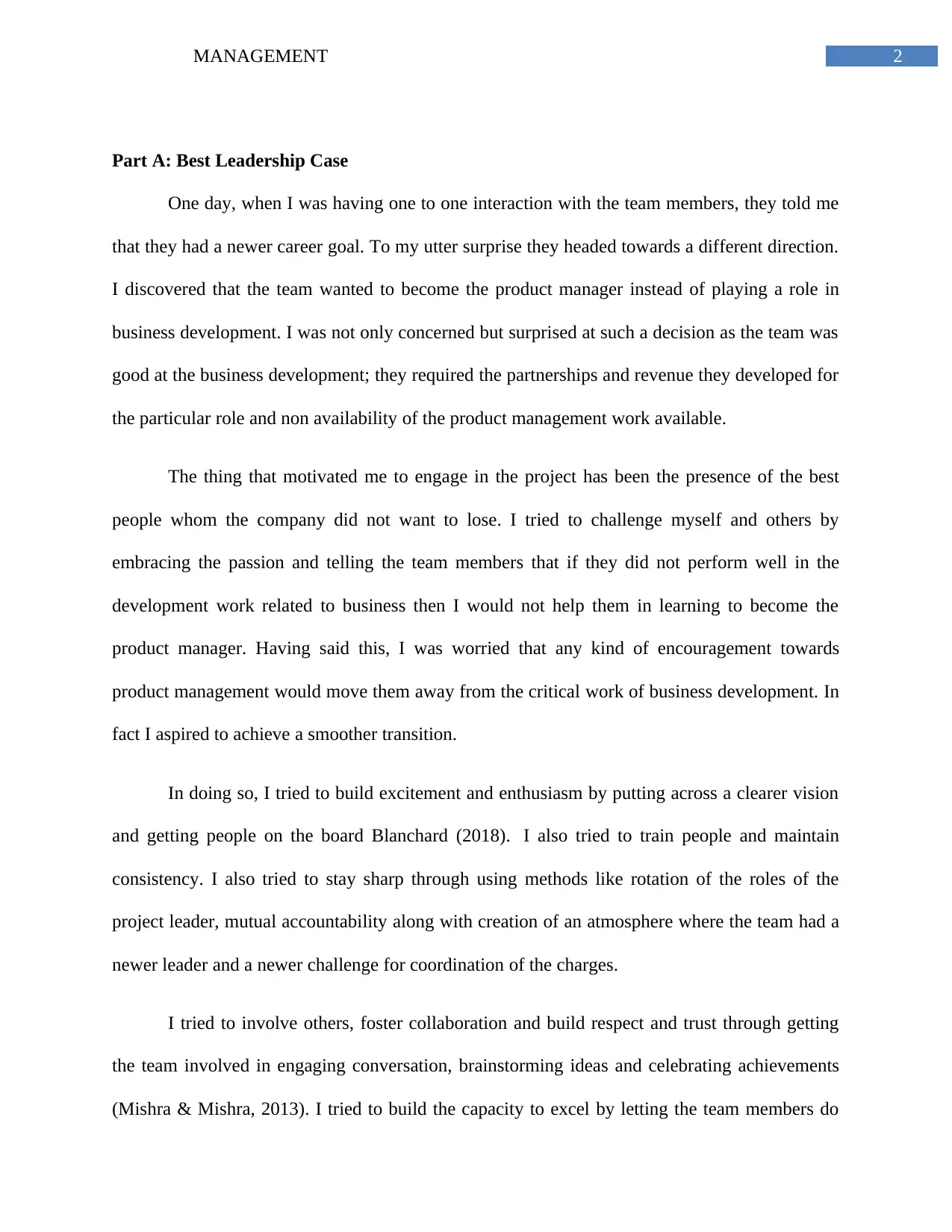
2MANAGEMENT
Part A: Best Leadership Case
One day, when I was having one to one interaction with the team members, they told me
that they had a newer career goal. To my utter surprise they headed towards a different direction.
I discovered that the team wanted to become the product manager instead of playing a role in
business development. I was not only concerned but surprised at such a decision as the team was
good at the business development; they required the partnerships and revenue they developed for
the particular role and non availability of the product management work available.
The thing that motivated me to engage in the project has been the presence of the best
people whom the company did not want to lose. I tried to challenge myself and others by
embracing the passion and telling the team members that if they did not perform well in the
development work related to business then I would not help them in learning to become the
product manager. Having said this, I was worried that any kind of encouragement towards
product management would move them away from the critical work of business development. In
fact I aspired to achieve a smoother transition.
In doing so, I tried to build excitement and enthusiasm by putting across a clearer vision
and getting people on the board Blanchard (2018). I also tried to train people and maintain
consistency. I also tried to stay sharp through using methods like rotation of the roles of the
project leader, mutual accountability along with creation of an atmosphere where the team had a
newer leader and a newer challenge for coordination of the charges.
I tried to involve others, foster collaboration and build respect and trust through getting
the team involved in engaging conversation, brainstorming ideas and celebrating achievements
(Mishra & Mishra, 2013). I tried to build the capacity to excel by letting the team members do
Part A: Best Leadership Case
One day, when I was having one to one interaction with the team members, they told me
that they had a newer career goal. To my utter surprise they headed towards a different direction.
I discovered that the team wanted to become the product manager instead of playing a role in
business development. I was not only concerned but surprised at such a decision as the team was
good at the business development; they required the partnerships and revenue they developed for
the particular role and non availability of the product management work available.
The thing that motivated me to engage in the project has been the presence of the best
people whom the company did not want to lose. I tried to challenge myself and others by
embracing the passion and telling the team members that if they did not perform well in the
development work related to business then I would not help them in learning to become the
product manager. Having said this, I was worried that any kind of encouragement towards
product management would move them away from the critical work of business development. In
fact I aspired to achieve a smoother transition.
In doing so, I tried to build excitement and enthusiasm by putting across a clearer vision
and getting people on the board Blanchard (2018). I also tried to train people and maintain
consistency. I also tried to stay sharp through using methods like rotation of the roles of the
project leader, mutual accountability along with creation of an atmosphere where the team had a
newer leader and a newer challenge for coordination of the charges.
I tried to involve others, foster collaboration and build respect and trust through getting
the team involved in engaging conversation, brainstorming ideas and celebrating achievements
(Mishra & Mishra, 2013). I tried to build the capacity to excel by letting the team members do
⊘ This is a preview!⊘
Do you want full access?
Subscribe today to unlock all pages.

Trusted by 1+ million students worldwide
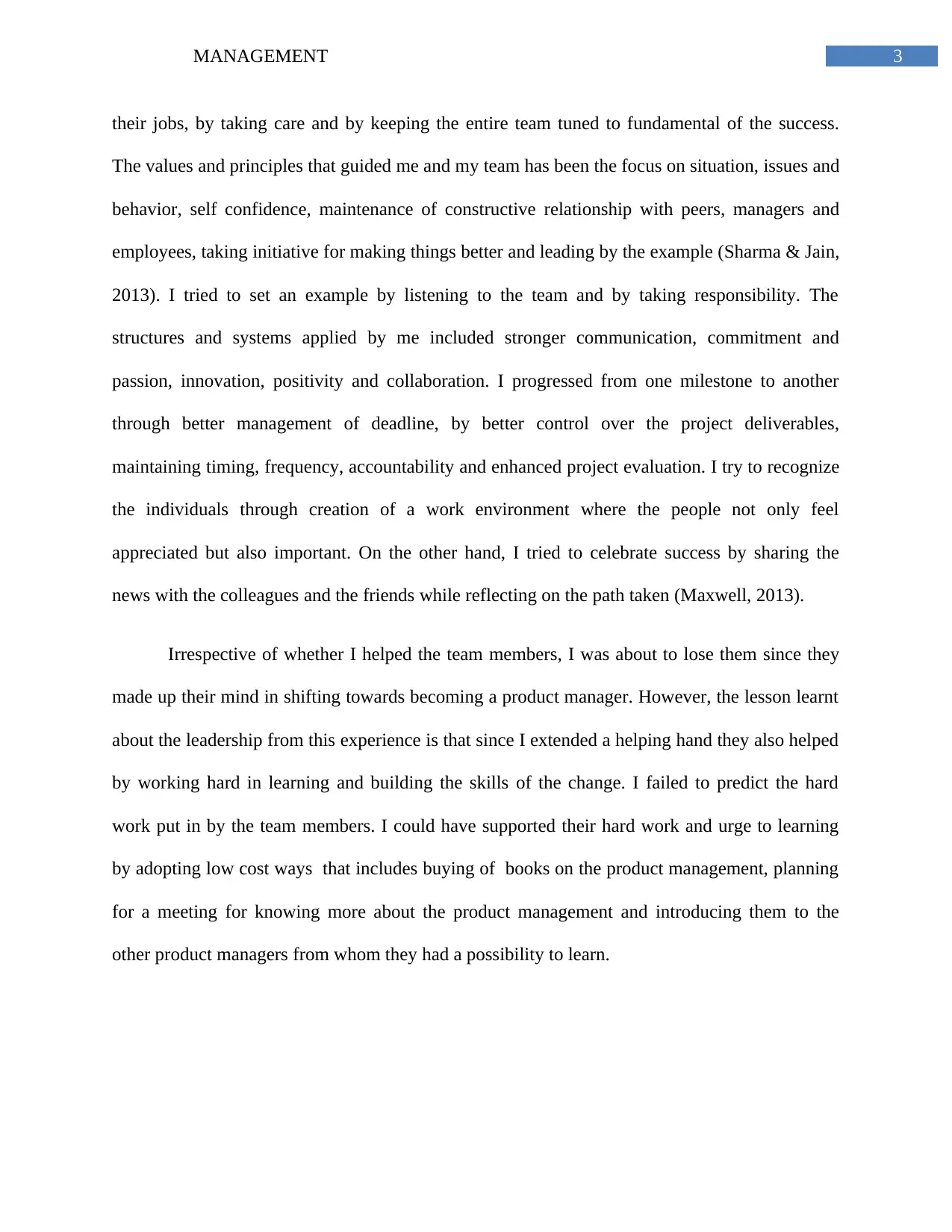
3MANAGEMENT
their jobs, by taking care and by keeping the entire team tuned to fundamental of the success.
The values and principles that guided me and my team has been the focus on situation, issues and
behavior, self confidence, maintenance of constructive relationship with peers, managers and
employees, taking initiative for making things better and leading by the example (Sharma & Jain,
2013). I tried to set an example by listening to the team and by taking responsibility. The
structures and systems applied by me included stronger communication, commitment and
passion, innovation, positivity and collaboration. I progressed from one milestone to another
through better management of deadline, by better control over the project deliverables,
maintaining timing, frequency, accountability and enhanced project evaluation. I try to recognize
the individuals through creation of a work environment where the people not only feel
appreciated but also important. On the other hand, I tried to celebrate success by sharing the
news with the colleagues and the friends while reflecting on the path taken (Maxwell, 2013).
Irrespective of whether I helped the team members, I was about to lose them since they
made up their mind in shifting towards becoming a product manager. However, the lesson learnt
about the leadership from this experience is that since I extended a helping hand they also helped
by working hard in learning and building the skills of the change. I failed to predict the hard
work put in by the team members. I could have supported their hard work and urge to learning
by adopting low cost ways that includes buying of books on the product management, planning
for a meeting for knowing more about the product management and introducing them to the
other product managers from whom they had a possibility to learn.
their jobs, by taking care and by keeping the entire team tuned to fundamental of the success.
The values and principles that guided me and my team has been the focus on situation, issues and
behavior, self confidence, maintenance of constructive relationship with peers, managers and
employees, taking initiative for making things better and leading by the example (Sharma & Jain,
2013). I tried to set an example by listening to the team and by taking responsibility. The
structures and systems applied by me included stronger communication, commitment and
passion, innovation, positivity and collaboration. I progressed from one milestone to another
through better management of deadline, by better control over the project deliverables,
maintaining timing, frequency, accountability and enhanced project evaluation. I try to recognize
the individuals through creation of a work environment where the people not only feel
appreciated but also important. On the other hand, I tried to celebrate success by sharing the
news with the colleagues and the friends while reflecting on the path taken (Maxwell, 2013).
Irrespective of whether I helped the team members, I was about to lose them since they
made up their mind in shifting towards becoming a product manager. However, the lesson learnt
about the leadership from this experience is that since I extended a helping hand they also helped
by working hard in learning and building the skills of the change. I failed to predict the hard
work put in by the team members. I could have supported their hard work and urge to learning
by adopting low cost ways that includes buying of books on the product management, planning
for a meeting for knowing more about the product management and introducing them to the
other product managers from whom they had a possibility to learn.
Paraphrase This Document
Need a fresh take? Get an instant paraphrase of this document with our AI Paraphraser
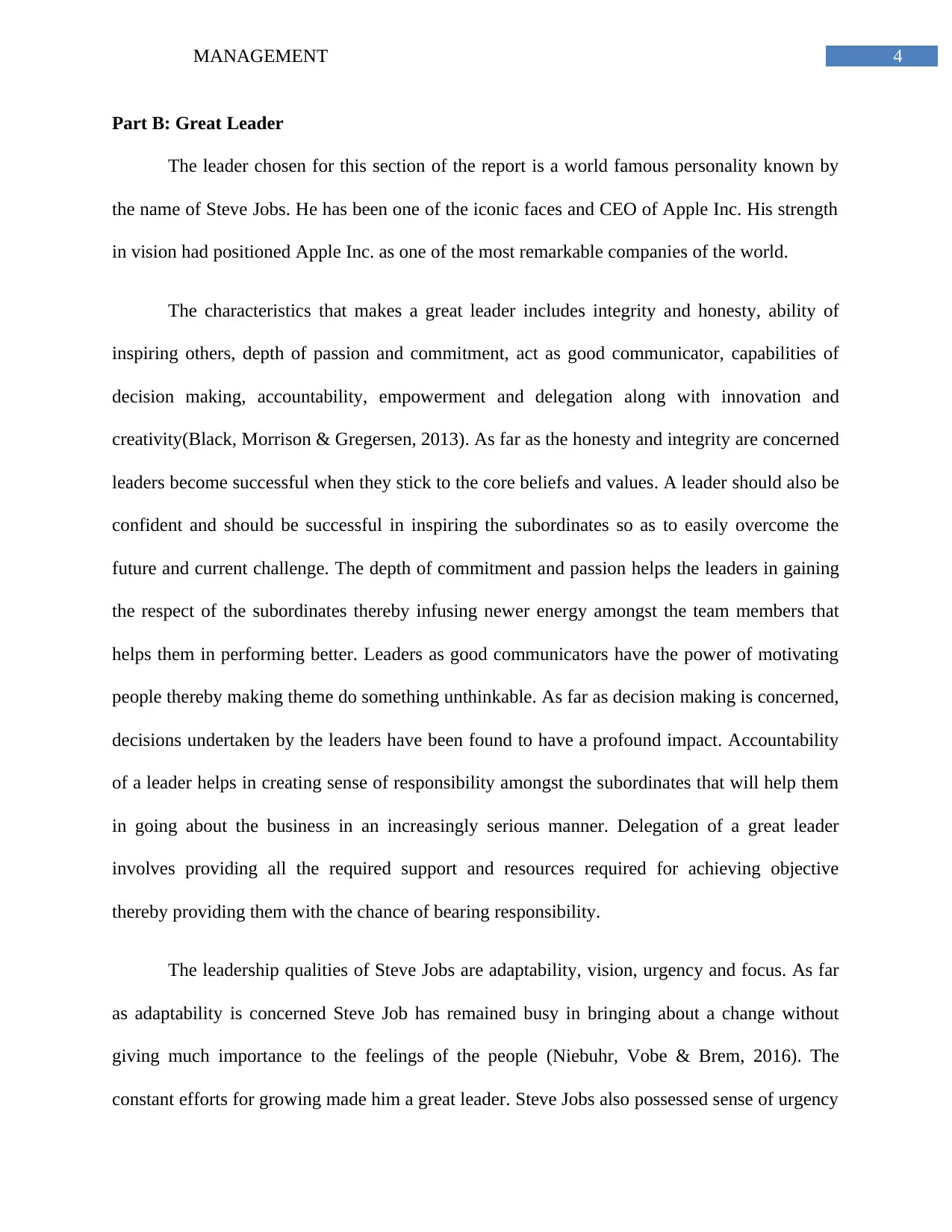
4MANAGEMENT
Part B: Great Leader
The leader chosen for this section of the report is a world famous personality known by
the name of Steve Jobs. He has been one of the iconic faces and CEO of Apple Inc. His strength
in vision had positioned Apple Inc. as one of the most remarkable companies of the world.
The characteristics that makes a great leader includes integrity and honesty, ability of
inspiring others, depth of passion and commitment, act as good communicator, capabilities of
decision making, accountability, empowerment and delegation along with innovation and
creativity(Black, Morrison & Gregersen, 2013). As far as the honesty and integrity are concerned
leaders become successful when they stick to the core beliefs and values. A leader should also be
confident and should be successful in inspiring the subordinates so as to easily overcome the
future and current challenge. The depth of commitment and passion helps the leaders in gaining
the respect of the subordinates thereby infusing newer energy amongst the team members that
helps them in performing better. Leaders as good communicators have the power of motivating
people thereby making theme do something unthinkable. As far as decision making is concerned,
decisions undertaken by the leaders have been found to have a profound impact. Accountability
of a leader helps in creating sense of responsibility amongst the subordinates that will help them
in going about the business in an increasingly serious manner. Delegation of a great leader
involves providing all the required support and resources required for achieving objective
thereby providing them with the chance of bearing responsibility.
The leadership qualities of Steve Jobs are adaptability, vision, urgency and focus. As far
as adaptability is concerned Steve Job has remained busy in bringing about a change without
giving much importance to the feelings of the people (Niebuhr, Vobe & Brem, 2016). The
constant efforts for growing made him a great leader. Steve Jobs also possessed sense of urgency
Part B: Great Leader
The leader chosen for this section of the report is a world famous personality known by
the name of Steve Jobs. He has been one of the iconic faces and CEO of Apple Inc. His strength
in vision had positioned Apple Inc. as one of the most remarkable companies of the world.
The characteristics that makes a great leader includes integrity and honesty, ability of
inspiring others, depth of passion and commitment, act as good communicator, capabilities of
decision making, accountability, empowerment and delegation along with innovation and
creativity(Black, Morrison & Gregersen, 2013). As far as the honesty and integrity are concerned
leaders become successful when they stick to the core beliefs and values. A leader should also be
confident and should be successful in inspiring the subordinates so as to easily overcome the
future and current challenge. The depth of commitment and passion helps the leaders in gaining
the respect of the subordinates thereby infusing newer energy amongst the team members that
helps them in performing better. Leaders as good communicators have the power of motivating
people thereby making theme do something unthinkable. As far as decision making is concerned,
decisions undertaken by the leaders have been found to have a profound impact. Accountability
of a leader helps in creating sense of responsibility amongst the subordinates that will help them
in going about the business in an increasingly serious manner. Delegation of a great leader
involves providing all the required support and resources required for achieving objective
thereby providing them with the chance of bearing responsibility.
The leadership qualities of Steve Jobs are adaptability, vision, urgency and focus. As far
as adaptability is concerned Steve Job has remained busy in bringing about a change without
giving much importance to the feelings of the people (Niebuhr, Vobe & Brem, 2016). The
constant efforts for growing made him a great leader. Steve Jobs also possessed sense of urgency
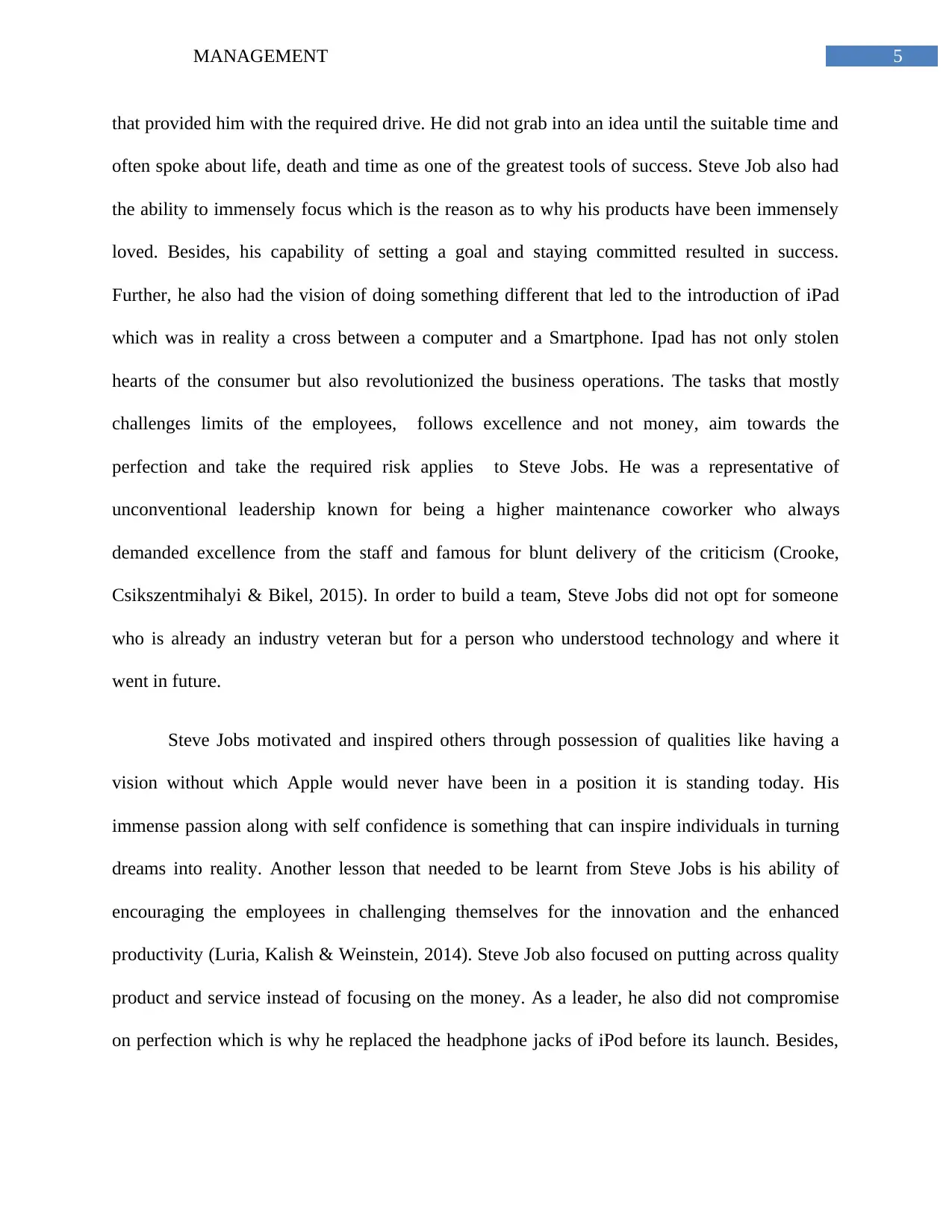
5MANAGEMENT
that provided him with the required drive. He did not grab into an idea until the suitable time and
often spoke about life, death and time as one of the greatest tools of success. Steve Job also had
the ability to immensely focus which is the reason as to why his products have been immensely
loved. Besides, his capability of setting a goal and staying committed resulted in success.
Further, he also had the vision of doing something different that led to the introduction of iPad
which was in reality a cross between a computer and a Smartphone. Ipad has not only stolen
hearts of the consumer but also revolutionized the business operations. The tasks that mostly
challenges limits of the employees, follows excellence and not money, aim towards the
perfection and take the required risk applies to Steve Jobs. He was a representative of
unconventional leadership known for being a higher maintenance coworker who always
demanded excellence from the staff and famous for blunt delivery of the criticism (Crooke,
Csikszentmihalyi & Bikel, 2015). In order to build a team, Steve Jobs did not opt for someone
who is already an industry veteran but for a person who understood technology and where it
went in future.
Steve Jobs motivated and inspired others through possession of qualities like having a
vision without which Apple would never have been in a position it is standing today. His
immense passion along with self confidence is something that can inspire individuals in turning
dreams into reality. Another lesson that needed to be learnt from Steve Jobs is his ability of
encouraging the employees in challenging themselves for the innovation and the enhanced
productivity (Luria, Kalish & Weinstein, 2014). Steve Job also focused on putting across quality
product and service instead of focusing on the money. As a leader, he also did not compromise
on perfection which is why he replaced the headphone jacks of iPod before its launch. Besides,
that provided him with the required drive. He did not grab into an idea until the suitable time and
often spoke about life, death and time as one of the greatest tools of success. Steve Job also had
the ability to immensely focus which is the reason as to why his products have been immensely
loved. Besides, his capability of setting a goal and staying committed resulted in success.
Further, he also had the vision of doing something different that led to the introduction of iPad
which was in reality a cross between a computer and a Smartphone. Ipad has not only stolen
hearts of the consumer but also revolutionized the business operations. The tasks that mostly
challenges limits of the employees, follows excellence and not money, aim towards the
perfection and take the required risk applies to Steve Jobs. He was a representative of
unconventional leadership known for being a higher maintenance coworker who always
demanded excellence from the staff and famous for blunt delivery of the criticism (Crooke,
Csikszentmihalyi & Bikel, 2015). In order to build a team, Steve Jobs did not opt for someone
who is already an industry veteran but for a person who understood technology and where it
went in future.
Steve Jobs motivated and inspired others through possession of qualities like having a
vision without which Apple would never have been in a position it is standing today. His
immense passion along with self confidence is something that can inspire individuals in turning
dreams into reality. Another lesson that needed to be learnt from Steve Jobs is his ability of
encouraging the employees in challenging themselves for the innovation and the enhanced
productivity (Luria, Kalish & Weinstein, 2014). Steve Job also focused on putting across quality
product and service instead of focusing on the money. As a leader, he also did not compromise
on perfection which is why he replaced the headphone jacks of iPod before its launch. Besides,
⊘ This is a preview!⊘
Do you want full access?
Subscribe today to unlock all pages.

Trusted by 1+ million students worldwide
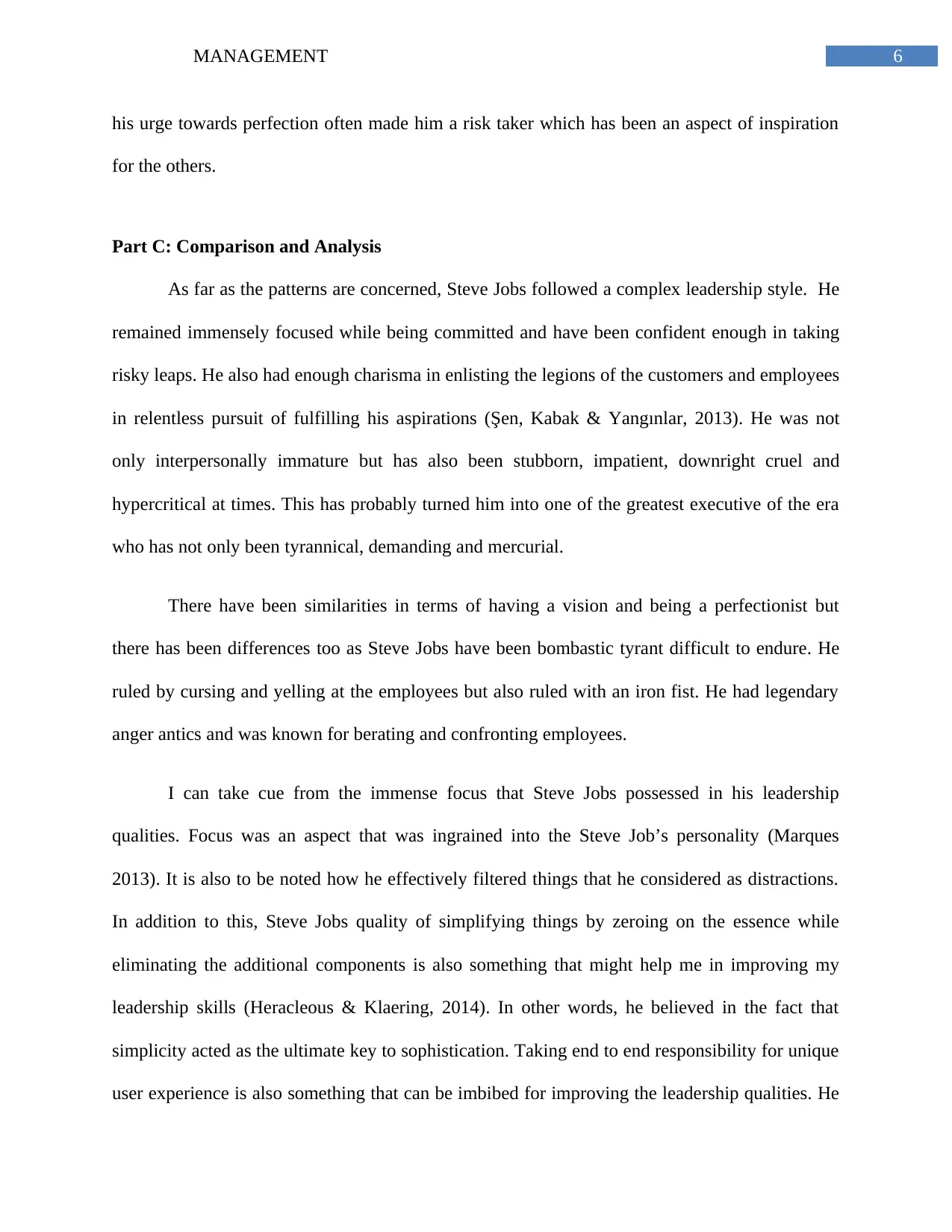
6MANAGEMENT
his urge towards perfection often made him a risk taker which has been an aspect of inspiration
for the others.
Part C: Comparison and Analysis
As far as the patterns are concerned, Steve Jobs followed a complex leadership style. He
remained immensely focused while being committed and have been confident enough in taking
risky leaps. He also had enough charisma in enlisting the legions of the customers and employees
in relentless pursuit of fulfilling his aspirations (Şen, Kabak & Yangınlar, 2013). He was not
only interpersonally immature but has also been stubborn, impatient, downright cruel and
hypercritical at times. This has probably turned him into one of the greatest executive of the era
who has not only been tyrannical, demanding and mercurial.
There have been similarities in terms of having a vision and being a perfectionist but
there has been differences too as Steve Jobs have been bombastic tyrant difficult to endure. He
ruled by cursing and yelling at the employees but also ruled with an iron fist. He had legendary
anger antics and was known for berating and confronting employees.
I can take cue from the immense focus that Steve Jobs possessed in his leadership
qualities. Focus was an aspect that was ingrained into the Steve Job’s personality (Marques
2013). It is also to be noted how he effectively filtered things that he considered as distractions.
In addition to this, Steve Jobs quality of simplifying things by zeroing on the essence while
eliminating the additional components is also something that might help me in improving my
leadership skills (Heracleous & Klaering, 2014). In other words, he believed in the fact that
simplicity acted as the ultimate key to sophistication. Taking end to end responsibility for unique
user experience is also something that can be imbibed for improving the leadership qualities. He
his urge towards perfection often made him a risk taker which has been an aspect of inspiration
for the others.
Part C: Comparison and Analysis
As far as the patterns are concerned, Steve Jobs followed a complex leadership style. He
remained immensely focused while being committed and have been confident enough in taking
risky leaps. He also had enough charisma in enlisting the legions of the customers and employees
in relentless pursuit of fulfilling his aspirations (Şen, Kabak & Yangınlar, 2013). He was not
only interpersonally immature but has also been stubborn, impatient, downright cruel and
hypercritical at times. This has probably turned him into one of the greatest executive of the era
who has not only been tyrannical, demanding and mercurial.
There have been similarities in terms of having a vision and being a perfectionist but
there has been differences too as Steve Jobs have been bombastic tyrant difficult to endure. He
ruled by cursing and yelling at the employees but also ruled with an iron fist. He had legendary
anger antics and was known for berating and confronting employees.
I can take cue from the immense focus that Steve Jobs possessed in his leadership
qualities. Focus was an aspect that was ingrained into the Steve Job’s personality (Marques
2013). It is also to be noted how he effectively filtered things that he considered as distractions.
In addition to this, Steve Jobs quality of simplifying things by zeroing on the essence while
eliminating the additional components is also something that might help me in improving my
leadership skills (Heracleous & Klaering, 2014). In other words, he believed in the fact that
simplicity acted as the ultimate key to sophistication. Taking end to end responsibility for unique
user experience is also something that can be imbibed for improving the leadership qualities. He
Paraphrase This Document
Need a fresh take? Get an instant paraphrase of this document with our AI Paraphraser

7MANAGEMENT
also taught how to leapfrog with innovation when left behind (Toma & Marinescu, 2013). One of
the vital qualities of leadership that he possessed was that he never spoke of cost trade-offs or
maximization of profits but concentrated only on the products.
also taught how to leapfrog with innovation when left behind (Toma & Marinescu, 2013). One of
the vital qualities of leadership that he possessed was that he never spoke of cost trade-offs or
maximization of profits but concentrated only on the products.
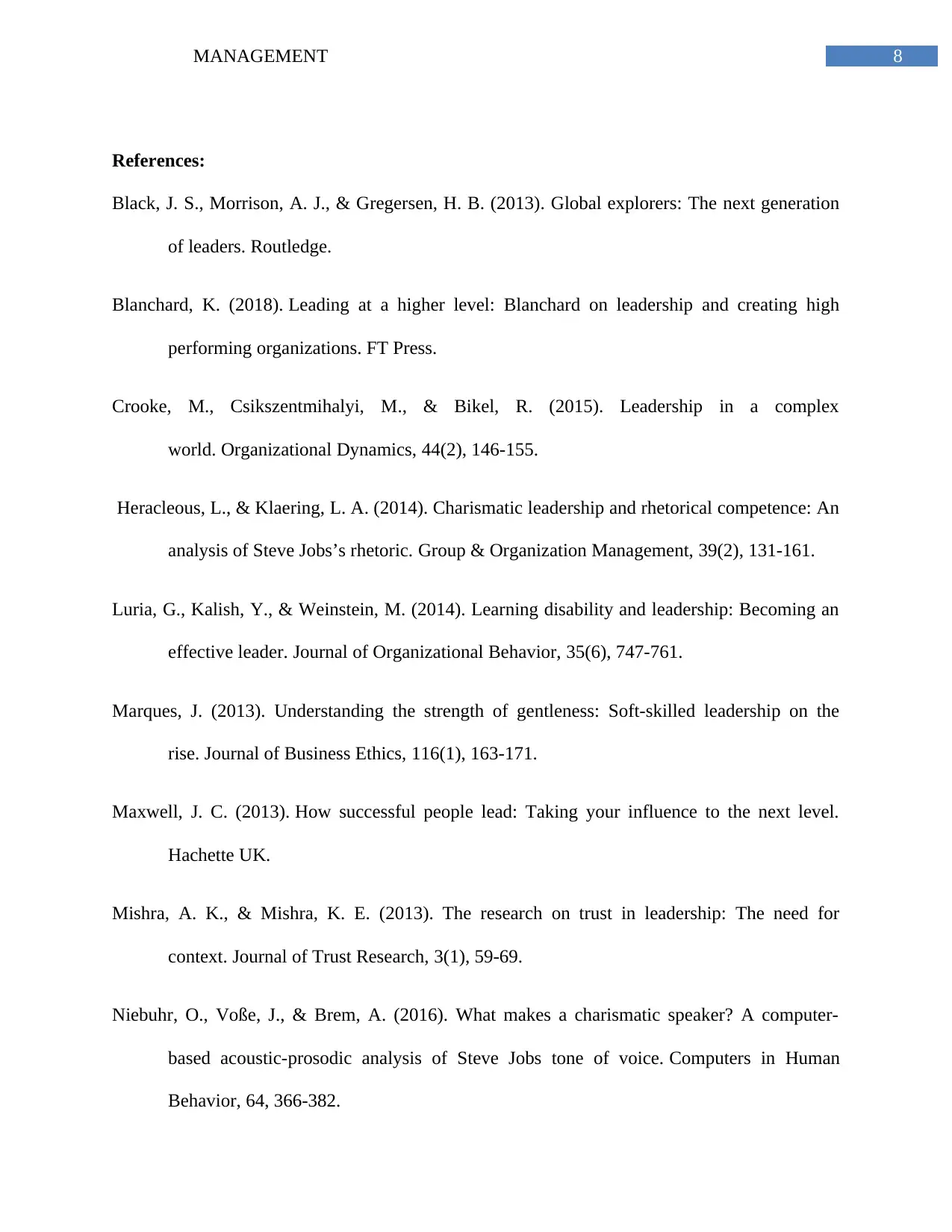
8MANAGEMENT
References:
Black, J. S., Morrison, A. J., & Gregersen, H. B. (2013). Global explorers: The next generation
of leaders. Routledge.
Blanchard, K. (2018). Leading at a higher level: Blanchard on leadership and creating high
performing organizations. FT Press.
Crooke, M., Csikszentmihalyi, M., & Bikel, R. (2015). Leadership in a complex
world. Organizational Dynamics, 44(2), 146-155.
Heracleous, L., & Klaering, L. A. (2014). Charismatic leadership and rhetorical competence: An
analysis of Steve Jobs’s rhetoric. Group & Organization Management, 39(2), 131-161.
Luria, G., Kalish, Y., & Weinstein, M. (2014). Learning disability and leadership: Becoming an
effective leader. Journal of Organizational Behavior, 35(6), 747-761.
Marques, J. (2013). Understanding the strength of gentleness: Soft-skilled leadership on the
rise. Journal of Business Ethics, 116(1), 163-171.
Maxwell, J. C. (2013). How successful people lead: Taking your influence to the next level.
Hachette UK.
Mishra, A. K., & Mishra, K. E. (2013). The research on trust in leadership: The need for
context. Journal of Trust Research, 3(1), 59-69.
Niebuhr, O., Voße, J., & Brem, A. (2016). What makes a charismatic speaker? A computer-
based acoustic-prosodic analysis of Steve Jobs tone of voice. Computers in Human
Behavior, 64, 366-382.
References:
Black, J. S., Morrison, A. J., & Gregersen, H. B. (2013). Global explorers: The next generation
of leaders. Routledge.
Blanchard, K. (2018). Leading at a higher level: Blanchard on leadership and creating high
performing organizations. FT Press.
Crooke, M., Csikszentmihalyi, M., & Bikel, R. (2015). Leadership in a complex
world. Organizational Dynamics, 44(2), 146-155.
Heracleous, L., & Klaering, L. A. (2014). Charismatic leadership and rhetorical competence: An
analysis of Steve Jobs’s rhetoric. Group & Organization Management, 39(2), 131-161.
Luria, G., Kalish, Y., & Weinstein, M. (2014). Learning disability and leadership: Becoming an
effective leader. Journal of Organizational Behavior, 35(6), 747-761.
Marques, J. (2013). Understanding the strength of gentleness: Soft-skilled leadership on the
rise. Journal of Business Ethics, 116(1), 163-171.
Maxwell, J. C. (2013). How successful people lead: Taking your influence to the next level.
Hachette UK.
Mishra, A. K., & Mishra, K. E. (2013). The research on trust in leadership: The need for
context. Journal of Trust Research, 3(1), 59-69.
Niebuhr, O., Voße, J., & Brem, A. (2016). What makes a charismatic speaker? A computer-
based acoustic-prosodic analysis of Steve Jobs tone of voice. Computers in Human
Behavior, 64, 366-382.
⊘ This is a preview!⊘
Do you want full access?
Subscribe today to unlock all pages.

Trusted by 1+ million students worldwide
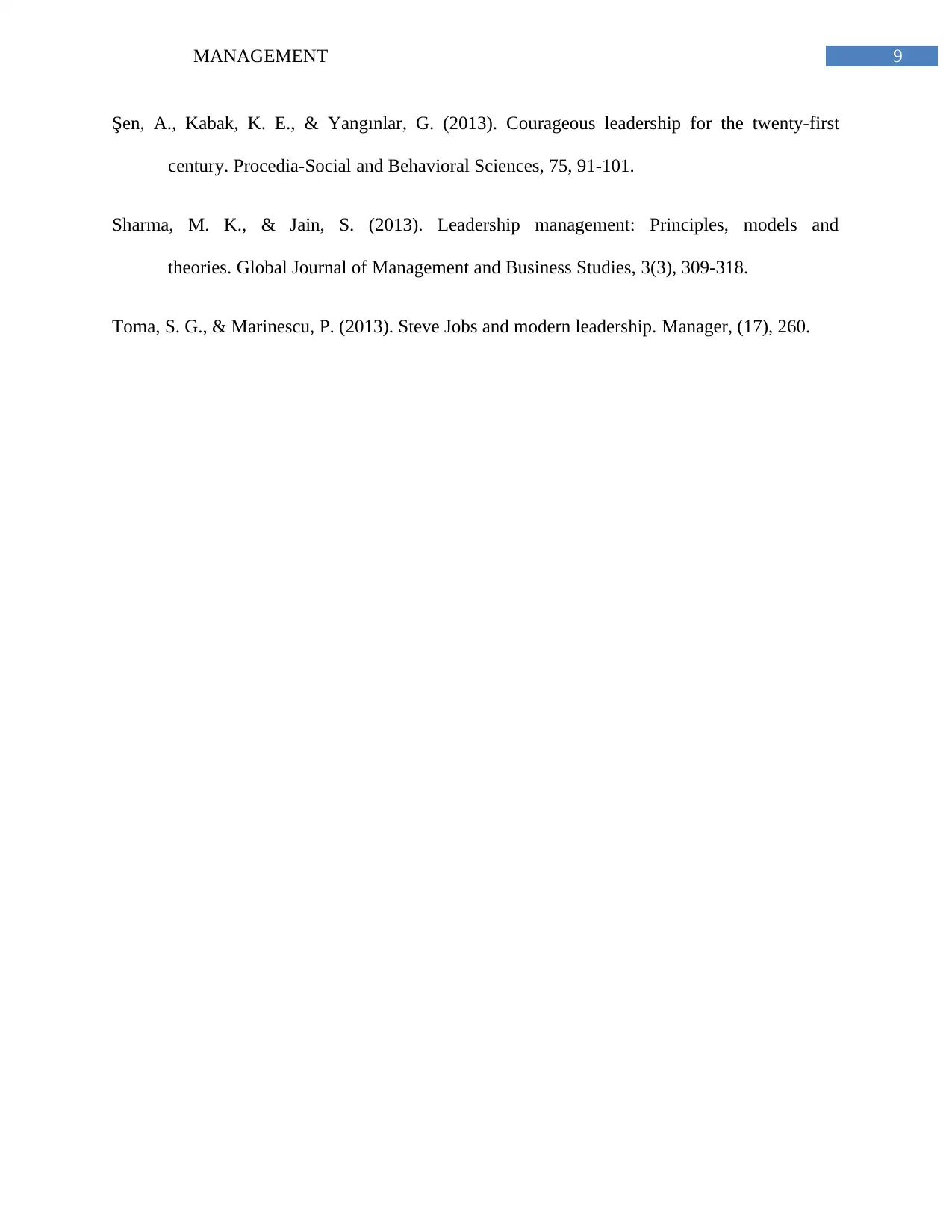
9MANAGEMENT
Şen, A., Kabak, K. E., & Yangınlar, G. (2013). Courageous leadership for the twenty-first
century. Procedia-Social and Behavioral Sciences, 75, 91-101.
Sharma, M. K., & Jain, S. (2013). Leadership management: Principles, models and
theories. Global Journal of Management and Business Studies, 3(3), 309-318.
Toma, S. G., & Marinescu, P. (2013). Steve Jobs and modern leadership. Manager, (17), 260.
Şen, A., Kabak, K. E., & Yangınlar, G. (2013). Courageous leadership for the twenty-first
century. Procedia-Social and Behavioral Sciences, 75, 91-101.
Sharma, M. K., & Jain, S. (2013). Leadership management: Principles, models and
theories. Global Journal of Management and Business Studies, 3(3), 309-318.
Toma, S. G., & Marinescu, P. (2013). Steve Jobs and modern leadership. Manager, (17), 260.
1 out of 10
Related Documents
Your All-in-One AI-Powered Toolkit for Academic Success.
+13062052269
info@desklib.com
Available 24*7 on WhatsApp / Email
![[object Object]](/_next/static/media/star-bottom.7253800d.svg)
Unlock your academic potential
Copyright © 2020–2026 A2Z Services. All Rights Reserved. Developed and managed by ZUCOL.





